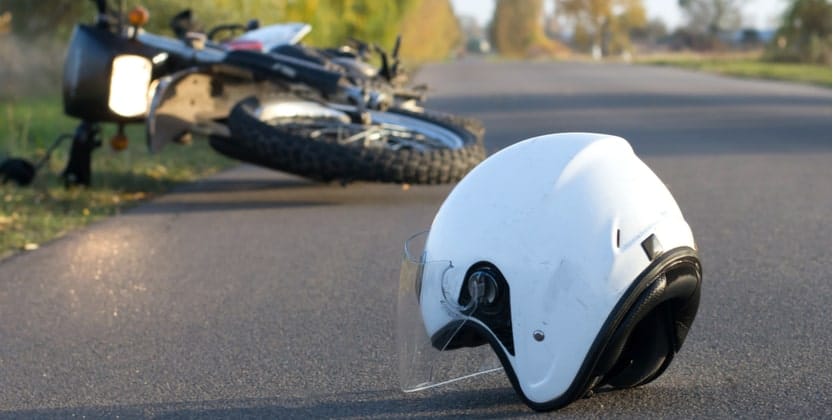In 2016, the number of registered motorcycles in the state of Florida exceeded 580,000. That same year, 56 out of every 100,000 registered motorcycles were involved in a fatal crash. It is estimated that motorcyclists may be up to 35 times more likely to be involved in a fatal crash than passenger vehicle drivers and riders.
Without airbags and seat belts, motorcyclists are more likely to suffer injury in an accident than a car's driver. While broken and fractured bones, burns, and tissue damages can seem unavoidable in the event of an accident, an often lesser-known risk is psychological trauma.

Following a motorcycle accident, difficulty sleeping, mood swings, severe anxiety, and memory troubles consistent with Post-Traumatic Stress Disorder (PTSD) commonly plague victims. If you have experienced injuries following a motorcycle accident, speak to an experienced motorcycle accident attorney near you today!
The Hidden Danger of Head Injuries
The impact of a vehicle hitting a motorcycle can be severe, as a majority of the force is absorbed by the motorcycle and its rider. This force can cause severe trauma, resulting in death or debilitating short- and long-term injuries. Specifically, head injuries are a major concern for motorcyclists in the event of an accident.
While many states have implemented helmet laws, the state of Florida allows any rider over the age of 21 to operate or ride a motorcycle without wearing a helmet, so long as they are covered by an insurance policy. This is problematic for riders, as motorcyclists who fail to wear protective gear face a significantly increased risk of severe trauma during a motorcycle accident.
Recent data suggests that helmets alone may prevent motorcycle fatalities from severe trauma by 37 percent. They can also prevent against traumatic brain injuries (TBI),which contribute to nearly one-third of injury-related fatalities in the U.S. Furthermore, research has found that:
- Half of all people with TBI are affected by depression within the first year after injury.
- Nearly two-thirds are affected within seven years after injury.
- For comparison, in the general population, the rate of depression is much lower - fewer than one person in 10 over a one-year period.
- More than half of the people with TBI who are depressed also have significant anxiety.
Post-Traumatic Stress Disorder Following a Crash
Post-Traumatic Stress Disorder, commonly abbreviated as PTSD, is a common result of a traumatic motorcycle crash. The condition can manifest for a variety of reasons, but its symptoms are typically grouped into three categories:
- Re-Experiencing - Flashbacks, nightmares, and thoughts about the accident.
- Avoidance - Difficulty remembering the event, avoiding certain events or actions, emotional numbness, guilt, and depression.
- Hyperarousal - Easily startled, trouble sleeping, edginess, and extreme episodes of anger.
For many victims, they are completely unaware that motorcycle accidents can cause PTSD. When victims of motorcycle accidents can't remember the events of their accident, can't sleep at night, or even hesitate to participate in events they once enjoyed, they might attribute the symptoms to their injuries alone. However, psychological trauma is a very real issue that is plaguing Florida riders who have been involved in motorcycle crashes.
Understanding Symptoms to Watch
As a victim of a motorcycle accident, or as a loved one of a victim, it can be incredibly difficult to suffer through such troubling emotions. Aside from healing from physical injuries, psychological trauma's stress and mental strain can leave a victim unable to return to work, unmotivated to participate in life's activities, and can even delay their healing process.
Symptoms and signs of post-traumatic stress and mental anguish can take several forms following a motorcycle accident:
- Persistent dreams about the accident
- Recurring flashbacks or memories
- Obsessing over the details of the accident
- Anxiety or stress when remembering the accident
- Lack of interest in motorcycles or anything associated with motorcycles
- Loss of interest in other favorite activities
- Becoming withdrawn or detached from family and friends
- Inability to remember the accident
- Insomnia or other trouble sleeping
- Appearing "on alert" at all times
- Mood swings or irritability
- Difficulty concentrating
If symptoms persist for more than one month after the motorcycle accident, or begin more than three months after the crash, suspect PTSD. Visit a doctor or counselor to discuss what you've been feeling. It is possible to recover from psychological trauma such as PTSD with proper help.
A Legal Ally on Your Side
Psychological trauma is a legitimate injury. If you or someone you love has recently been involved in a motorcycle accident, contact a Florida motorcycle accident attorney as soon as possible. Statistically speaking, 80 percent of motorcycle accidents are caused by someone else's negligence - not the rider's.
From medical bills to lost wages and through the pain and suffering, you do not have to bear this weight alone. A trusted motorcycle accident lawyer can help you seek the medical help you need for your physical and psychological trauma, and help you fight for compensation for your damages. If you believe that you or a loved one is suffering psychological trauma after a motorcycle accident, contact the office of Weinstein Legal today to discuss your claims with an experienced personal injury lawyer.


